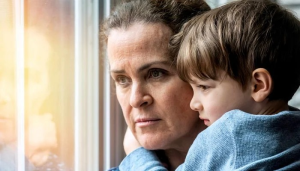The Equality Coalition keeps focus on Anti-Poverty Strategy
29 April 2024
By Becca Bor
The Northern Ireland Anti-Poverty Network (NIAPN) joined our partners in the Equality Coalition in giving evidence to the Communities Committee meeting on the urgent need for an anti-poverty strategy (APS) on 25 April.
The presentation focused on the legal obligation that the Executive has to adopt an APS, and the evidence-based recommendations that the department already has commissioned.
The main message was clear: the Executive must act, it is a legal requirement, the work has been done, the evidence base is there, any stalling at this point is unacceptable.
Daniel Holder, Committee for the Administration of Justice (CAJ), Trása Canavan, Barnardo’s NI, Becca Bor, NIAPN, and John Patrick Clayton, UNISON presented on behalf of the Equality Coalition.
An APS based on objective need has been a legal requirement of the Assembly since the St Andrews Agreement in 2007, and subsequently CAJ took a judicial review against the Executive in 2015, which found that the government was in breach of its obligation to enact an APS.
Since then, there have been two judgements relating to the Irish Language Act from judicial reviews taken by Conradh na Gaeilge that have relevance to an Anti-poverty strategy. Firstly, that there is a limited amount of time that a new Executive has to adopt a strategy before it is in breach of its legal duty and secondly if individual members of the Executive were thwarting the adoption of a strategy, there could be enforcement mechanisms directed at those members individually.
Immense work has already been completed and presented to the Department for Communities by the expert advisory panel and the co-design group. The evidence based recommendations are all there and now is the time for action. The scathing NI Audit Office report on the Child Poverty Strategy highlighted that any APS must have clear targets with ring-fenced funding, timely data and ongoing monitoring throughout the lifespan of the strategy.
Members of the communities committee asked questions about the cost of poverty to the Executive, our thoughts about the reasons behind any hold up from the department, the possibility of further legal action, and what we thought the next steps should be.
Whilst we know that the Audit Office estimated that the cost of child poverty was between £825m and £1 billion a year, and there are statistics from within departments about costs to poverty, we do not believe the department or frankly the Executive needs any more information or evidence to implement an APS. Everyone knows it is the right thing to do. We all know poverty is expensive. We all know it is immoral. Commissioning another paper to find the cost of poverty before a strategy is adopted is unacceptable. That said, one of the recommendations of the expert panel was to develop mechanism to audit the cost of poverty on an ongoing basis.
From the comments of the Permanent Secretary and the Minister it seems clear that there is a departure in thinking from the initial draft strategy. The Permanent Secretary Colum Boyle in presenting to the Communities Committee dismissed one of the central recommendations, a Child Payment, as an “artificial prop” and suggested the minister wanted to put his own stamp on the strategy, suggesting measures such as “wealth building” and job skills and opportunities.
Furthermore, the Minister had the following comments regarding the anti-poverty strategy to the Assembly on the debate regarding Child Poverty on 15 April:
“I have been considering how best to take the work forward at pace. I will shortly bring a paper to my Executive colleagues, setting out how we will develop the anti-poverty strategy and a timetable for that. Once the Executive agree the approach, I will be in a position to share it more widely. I note that much work was undertaken previously on an anti-poverty strategy.
However, given the time that has passed since that initial work was undertaken, the changing economic circumstances and a changing budgetary environment, it will be necessary to revisit and build on that work, reflecting the changing pressures and priorities that we face today and will face in the years to come.”
We strongly believe that not much has changed in these past few years – certainly the themes of the recommendations haven’t changed, the data and evidence of the need for an APS hasn’t changed, the difficult fiscal realities and budgetary pressures of Stormont haven’t really changed. However, without an actual draft strategy to engage with, it is hard to have any meaningful input at this stage.
Daniel Holder, Director of CAJ, commented that although legal challenges are always last resort, at this point we cannot rule out that as a possibility, as there is a legal duty to adopt an anti-poverty strategy. The Equality Coalition and our partners will continue to monitor the progress.
Though as of the meeting last Thursday, committee members had yet to see a draft strategy, the panel urged the Communities Committee to use the expert advisory panel’s evidence based recommendations and the work of the co-design group as a benchmark for the forthcoming draft strategy.
If the strategy from the department does not reflect the philosophy, principles and evidence based recommendations, then the strategy is frankly not good enough.
You can watch the proceeding here, beginning at 2.22.00:








